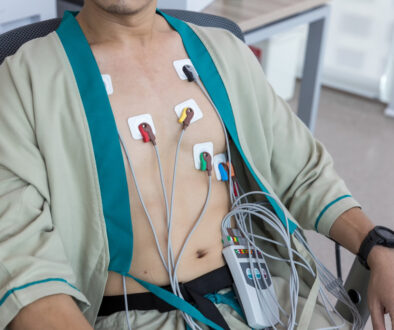What You Need To Know About Your Heart Test
Heart disease is #1 in America . . . for all the wrong reasons. Heart disease remains the number one cause of death in the United States. Taking an active role in your health is vital in preventing and treating heart disease, so following is some important information about various heart tests: what they are and what information they provide.
THE STRESS TEST
For this test, electrodes monitor the heart rhythm (an EKG) so the physician can evaluate how the heart reacts to physical stress. During the test, patients walk on a treadmill, gradually increasing their speed. The stress test monitors heart rate, blood pressure, breathing rate, and heart rhythm (through the EKG). Doctors may suggest this test if a patient complains of chest pain or the physician suspects the patient has an irregular heartbeat.
If your doctor recommends a stress test, be sure to wear comfortable, loose-fitting clothes and shoes appropriate for running or walking. Your doctor may also place limits on what you can or can’t eat before the test.
EKG
An electrocardiogram (sometimes referred to as an EKG or an ECG) measures heart rhythm. During this test, small electrodes will be attached to the patient’s arms, legs and chest. Wires from these electrodes send a signal to the EKG machine, which then records the pattern in the form of wavy lines. An EKG can determine:
- If a patient has had a heart attack
- Congenital heart defects
- Abnormal heart rhythms
- Heart inflammation
- Enlargement of the heart chambers
ECHOCARDIOGRAM
An echocardiogram (“echo”) uses sound waves to create pictures of the heart. This enables the physician to check the structures of the heart and evaluate how they are functioning. During the test, gel is placed on the patient’s chest and a technologist places a wand—called a transducer—over the area. The transducer produces sound waves that bounce off of heart tissue. The speed and intensity of the returning sound waves is processed by specialized equipment to produce an image of the heart. During the test, the technician may ask you to change position. Often, an EKG may be taken at the same time as the echo.
ADVICE FOR ANY STRESS TEST
Carefully follow your doctor’s instructions test preparation instructions. To the letter.
If you have any questions about the test, be sure to speak with your physician. It may help to take notes or have a notepad and pencil available to write these questions down, so you won’t forget anything. If you have a family history of heart disease, it is important that you let your doctor know. If you aren’t sure about your family’s medical history, this is the perfect opportunity to ask your parents and relatives about it.
The three, non-invasive tests listed here should be painless. However, if you develop chest pains or severe discomfort during these tests, immediately notify your physician or the health care professionals administering the test.




